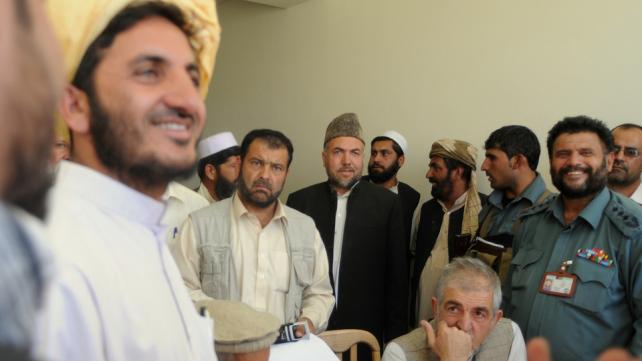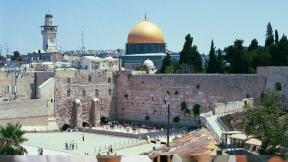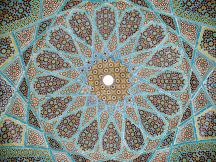
In Islam it is not enough for success to believe in God and worship Him. It would be just half of the test of one’s faith. The other half test is how our relationship is with other human beings.
After all, it’s so much easier to pray, fast, and contemplate without the distraction of other human beings who place impositions on our time, energy, and wealth. Yet, in Sharia, the Islamic way of life, it is only by serving other human beings that we can truly connect to our Creator. God holds the person in high esteem who tries to be just in his or her dealings, whether that is in relation to a business deal, a difficult parent or child, or an annoying neighbor.
In contrast, someone who neglects his or her duties to parents, children, neighbors, and society as a whole, even if they pray ardently, fast diligently, or contemplate daily, comes up as a zero.
The Twin Test of One’s Faith in Islam:
Connection with God & Connection with Humanity
There is a small chapter at the end of Quran called Small Kindnesses (Almaoon). In it, God describes the person who has lost the interconnectedness with others, and in turn has lost his faith. In this twin test of our faith God says:
"Have you ever seen a human being who contradicts the faith in God and His Judgment?
That is the person who pushes the orphan aside and does not promote feeding the poor.
Woe, then, unto those who pray,
but their hearts and minds are remote from the essence of their prayers, those who appear to pray,
but refuse to share necessities of life with others." (Quran 107)
Connecting with God and serving His Creation are, therefore, twin pillars of faith in Islam.
Prophet Muhammad, peace and blessings be upon him, said:
“The person who meets with people and endures the harm they do is better than the person who does not mix with them or endure the harm they do” (Recorded in the Hadith collections of Tirmidhi & Ibn Majah).
That may be why a conservative South Asian scholar, Ashraf Ali Thanwi, said one cannot be a good Muslim unless s/he first becomes a good human being.
Oneness of Humanity & Diversity
God says that human differences are for differentiation purposes only:
"O Mankind, We created you from a single pair of a male and a female and made you into nations and tribes, so that you may know one another. Verily the most honored of you in the sight of God is he who is the most righteous of you" (Quran 49:13).
From this short verse, Islamic scholars have drawn several fundamental Islamic principles which are reaffirmed elsewhere in the Quran and the Prophet’s teachings:
- God is addressing all of humanity here, not only the Muslims.
- God says that He created us from one man and one woman, thus making us all brothers and sisters.
- The verse invalidates the claims of superiority due to one’s birth by stating that all are born through a similar process, i.e. from a male and female.
- God made tribes and nations as a means of identifying and differentiating. This is not meant to be a source of superiority, nor as a contributing component of tribalism, caste systems, nationalisms, colonialism or racism.
- The only measure of greatness among human beings is at the individual level, not on a national or group level, based on the character of “Taqwa.” This Arabic term means a character build around God-consciousness.
- This singular criterion of preference, Taqwa, however, is not quite measurable by other human beings since it deals with the inner self. Therefore, human beings must leave even this criterion to God to decide rather than using it to judge each other. At the same time though, this principle does not mean that we are unable to differentiate between right and wrong behavior, nor does it prevent us from acting against wrong actions. Rather, it discourages the human tendency to ‘sit in judgment’ of others.
Elsewhere in the Quran, God asserts that He created all human beings as one people (one Ummah) and it is human beings who created divisions within themselves. (Quran 10:19).
In terms of religious coexistence, the Quran says:
“…To each among you have we prescribed a law (Sharia) and an open way. If God had so willed, He would have made you followers of one faith. But He willed otherwise to test you in what He has given you; therefore strive to excel one another in all virtues. Ultimately you all shall return to God; then He will show you the truth of those matters in which you dispute” (Quran 5:48).
This understanding of how human beings were created, as well as why humans are different, is built into the faith structure of Islam.
We believe that there is only One God who created all. We are asked to believe in all of the Prophets, not just Biblical Prophets but all. We are also asked not to prefer one Prophet above others in terms of respect. We are asked to believe in the earlier scriptures despite God’s criticism of people for changing those scriptures (Quran 2:285).
Any Muslim who does not believe in the whole set of these principles is not considered a believer by God (Quran 4: 136).
These principles are also a part of an Islamic social structure: justice and fairness, upholding the rights of the poor, as well as charity to those in need, extend to all people without any differentiation between a Muslim and a non-Muslim.
In the peace sanctuary of the Prophet, Madinah, the Prophet established peace between various tribal and faith groups after a hundred plus years of warfare. He negotiated and implemented a written constitution. Classical Islamic literature refers to this document in Arabic as “waseeqatun Nabi.”
What is significant about this document is that after stating the equal religious and legal rights of each of the Jewish and pagan tribes of Madinah, this document repeatedly uses the phrase "one Ummah with the believers." This constitution implemented the Quranic recognition of the presence of multiple religions as well as other variations among people, while keeping in mind the “oneness of humanity”, and offering equal security, mutual defense, legal and civic autonomy and freedom of religion to all citizens including those who worshiped idols.
Dealings with the Theological Divisions
While God insist people to follow Islam, He recognizes some will not. He, therefore, prefers that the differences in faith are to be referred back to God, Who will judge between us on a day when He is the Final Arbiter instead of quarrelling over religious differences (Quran 5:48).
In the meantime, we must learn to peacefully coexist by establishing cordial relationships of mutual benefit, thankfulness to each other, and care for the disadvantaged and neighbors, regardless of whether they share our faith or not. Muslims are required to cooperate for the good, in righteousness and piety for all, and not for sin and rancor (Quran 5:2).
The Islamic prayer called Salat literally means connection in Arabic. It connects us to our Creator five times a day. Another word derived from the same root is used for the connected phones. Another is used when referring to relations between human being, particularly family “Silatul Rahm”, with the word “Rahm” meaning the womb, giving precedence to ties that bind us through our birth.
Perhaps this is why in Islam, a person cannot give away all of their wealth even to charity without first making sure they have paid the inheritance shares due to family members.
But relations of the womb or blood are not the only ones that emphasize human interconnectedness in Islam. Neighbors are given high priority, regardless of whether they are Muslim or not. In Islam, therefore, relationships, justice, rights, and duties toward one’s neighbors are not limited to Muslims.
The Prophet once said:
"Angle Gabriel kept recommending treating neighbors with kindness until I thought he would assign a share of inheritance" (Recorded by the Hadith collection of Bukhari and Muslim).
This helps establish a connection with others beyond our immediate circle, particularly with those who we connect with regularly, even if it is just a “hello” in the driveway on the way to work or school in the morning. One example of how Islam establishes the right of neighbors is the fact that a neighbor has the first right to buy your property if you are selling it, even over your family.
But a neighbor in Islam is not just the person who lives on your block. The Quran’s definition is broader, and it includes 1) neighbors who are near, 2) neighbors who are of other ethnic background, 3) the person sitting, walking, working or studying next to you, 4) the traveler (Quran 4:36).
This should give us pause on days we think we can annoy the person sitting next to us on a plane, train or bus with a loud cellphone conversation, for example. Chapter 49 of the Quran offers us detailed advice about proper manners and behavior in relation to all human beings, including the above-mentioned types of neighbors, whether that is name-calling, spying, or backbiting.
Traditionally, Sharia has always emphasized the protection of faith, life, property, liberty, and safety of all, regardless of their faith. And it defines a violation of the sanctity of these rights of every citizen capital crimes.
These are Islamic ideals that Muslims the world over learn of through sermons, Imams, teachers and mothers, who still inspire one to live by these ideals. This is what 150 leading Islamic scholars asserted in the document known as “A Common Word.”
Islamic Ideals of Mutual Humanity in Practice
It was through the systemic incorporation of the concept of mutual humanity and other recognition of other religions into belief structures, laws and values that explains why Islamic societies, from the start, were racially diverse, multi-ethnic, and open to other faith communities. Whether it is Madinah, Baghdad, Andalus, Egypt, Timbuktu, Jerusalem, Istanbul, Bukhara or Delhi, one finds people of different races and religions living and working comfortably with each other by and large.
Rumi’s poetry, One thousand and One Nights, alif lailah, and the rest of Muslim classics depict the neighborhoods in the Muslim world as a large cosmopolitan culture in which ‘others’ are regular participants as neighbors, scholars, traders, partners, heroes as well as villains.
Rose Wilder Lane of “Little House on the Prairie” fame also known as an important libertarian philosopher as a result of her book “Discovery of Freedom,” asserts that Prophet Muhammad was the second most important sources of freedom in the world.
Although her reading of the Prophet’s contribution and Islamic civilization might be difficult for some to stomach in today’s Islamophobic environment, it is one which most Muslims continue to remember to inspire them in their efforts to make the world a more just place of human habitation without religious and racial animus.
Rose Wilder Lane came to these conclusions about 70 years ago when most of the Muslim world was still under colonial occupation. It was during these times that the ideals of Islam faced some of their major challenges.
Faced with the triple whammy of colonial occupation, cultural hegemony, and forced modernization, Muslims started reacting to events defensively instead of continuing to serve humanity at large and develop at their own rate of progress. Progress, which they helped define for a thousand years with their contributions to world civilization, which was open to all faiths and communities.
The Challenge of Living the Ideals for Mutual Humanity
Muslims, however, cannot claim that they have always lived these ideals individually or collectively. Unfortunately, there are many examples, which show Muslims living way below their own ideals and occasionally groups like Taliban and Hizbut Tahreer denying those ideals altogether or partially. We must consider ourselves individually responsible for our personal neglect and collectively, for the transgressions of other human beings – their basic right to healthy and productive lives and freedom of religion.
The human challenge to practically implement these principles was evident even in the Prophet’s life.
There are many Hadith, or teachings of the Prophet, quoting from his sermons, which repeatedly strike at Arab pride, pride in ancestry, and ill treatment of the other in terms of color, tribe, religion and class.
The Prophet realized the challenges of preaching the message of unity of humankind. Even in his farewell sermon shortly before his death, he made it a point to address this issue:
"O people, remember that your Lord is One. All mankind is from Adam and Eve. An Arab has no superiority over a non-Arab nor a non-Arab has any superiority over an Arab; also a white has no superiority over a black, nor [does] a black has any superiority over a white, except by piety and good action. Indeed, the noblest among you is the one with the best character (Taqwa).
Photo Attribution: "110814-O-1234C-004 (6045157901)" by NATO Training Mission-Afghanistan from AfghanistanCourtesy Photo/Combined Joint Task Force 1 - Afghanistan/U.S. Department of Defense - 110814-O-1234C-004Uploaded by russavia. Licensed under Public domain via Wikimedia Commons - http://commons.wikimedia.org/wiki/File:110814-O-1234C-004_(6045157901).jpg#mediaviewer/File:110814-O-1234C-004_(6045157901).jpg






Comments
This article doesn't say much
This article doesn't say much about how people are interconnected.
Add new comment